|
Aurora Gallery back to spaceweather.com |
| Summary: A coronal mass ejection (CME) swept past Earth on Nov. 20th and sparked bright auroras as far south as Florida in the United States and Greece in Europe. The source of the CME was sunspot 484--one of the trio of active regions that caused intense geomagnetic storms last month. See, e.g., the October 2003 aurora gallery. Page 1 | Page 2 | This is Page 3 Unless otherwise stated, all images are copyrighted by the photographers. |
| Photographer, Location | Images | Comments | |
|

|
Kevin
Forster, Wasilla, Alaska, USA Nov. 20 |
#1, #2, #3 | It was rare to see an aurora that was mainly blue. I used a Sony DSC717 and an ISO of 200. exposures were 3-8 seconds. The sky was very bright as it was quite late in the morning ~ 7:30am. |
|
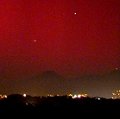
|
Anthony
Ayiomamitis, |
#1, more | As was the case last month, the impossible has happened in that we had the fortune to observe the Aurora Borealis thanks to the activity of AR10484 and in spite of the fact that the Mediterranean is so far away from the geomagnetic pole. Having followed the bulletins on SpaceWeather, I purposely kept an eye on the northern horizon and I was rewarded about 60 minutes before midnight. Having used the auroral activity last month as a learning experience, much better photos were obtained this time around which beautifully highlight the aurora with a setting Draco and rising Ursa Major. |
|
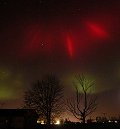
|
Terry
Mann, |
#1 | This was taken about 6:45 pm this evening. I used a Nikon 5000 camera with a fisheye lens at 400 ISO about 25 second exposure. The auroras were in the South and overhead. Mars was surrounded with red auroras! |
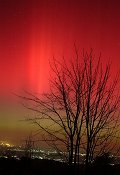
|
Hrvoje
Horvat, Zagreb, Croatia |
#1, #2, #3, more | The auroras were visible at least from 19h to 23h (22h UT). Photo details: 1600 ASA, 8 sec. exposure, 24mm Nikkor @ f2.4. |
|
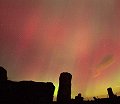
|
Jim
Henderson, near Aberdeen, Scotland Nov. 20 |
#1, #2, #3, #4, more | These images were taken this evening in the North East of Scotland UK, about 25 miles west of Aberdeen and later at the Tomnaverie Recumbent Stone Circle c 2000BC near Tarland, just over 35 miles west Aberdeen. Taken with a Fuji S2, Sigma 15mm Semi Fisheye f2.8 at 15 seconds. ISO at 800 |
|
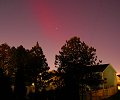
|
Pieter
Ibelings, Atlanta, Georgia, USA Nov. 20 |
#1, #2 | Image #1 shows airplane on final approach to Hartsfield International Airport (ATL) Photo details: Nikon D100, 400 ASA, 30sec exposure, 18-35mm f/3.5-4.5D |
|
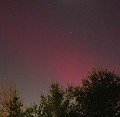
|
Monroe
Harden, Belcamp, Maryland, USA Nov. 20 |
#1, #2, more | Mostly green aurora in the west and south, with a faint red visible in the west. It looked very similar in the south to the one of Oct 30th. Photos taken with Nikon coolpix 4500, asa 800, 8 sec exposure, f2.6. |
|
|
Philippe
Moussette, Cap-Rouge Québec Canada Nov. 20 |
#1, more | Thiese auroras was photographed with a fisheye lens and a Coolpix 4500 camera at 400ASA, exposed for 15 seconds |
|

|
Dan
Bush, Albany, Missouri, USA Nov. 20 |
#1, more | Took this around 1:00 UT (Nov. 21 UT)here in Albany, Missouri. This view is looking east southeast. This event persisted for about 2 hours although it moved around in the southeastern sky some. Taken with Nikon Coolpix 995. One minute exposure. |
|
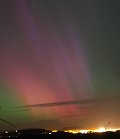
|
James
Burke, Sligo, Ireland Nov. 20 |
#1, #2, #3 | Canon Eos 1D, f2.8, 3 to 5 sec exposures |
|
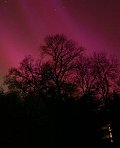
|
Neil
Grubb, Roslin Glen, Scotland Nov. 20 |
#1, #2 | Unheard of to have clear skies in Scotland for all the recent auroras! This one was so colourful - a fabulous display. Taken with new Canon EOS D300 digital SLR with 18-55mm lens at f4.0; ISO400; 25 seconds. |
|
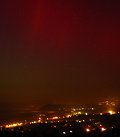
|
Anne Dussert,
Near Geneva (Switzerland), just above the lake (and the fog layer) |
#1, #2 |
Amazing ! Never seen anything like it at this latitude. |
|
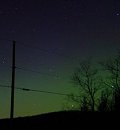
|
Charlie
Pritt, Terra Alta, West Virginia, USA |
#1, #2, #3, more | none |
|
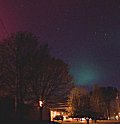
|
Rick
Davis, Dalton, Georgia, USA Nov. 20 |
#1, more | The auroras were bright even though light pollution was a problem. Photo details: Kodak DC4800, 200 ASA, 16 SEC exposure. |
more: from Janos Kelemen of Budapest, Hungary; from Jerry Xiaojin Zhu of Pittsburgh, PA, USA;

